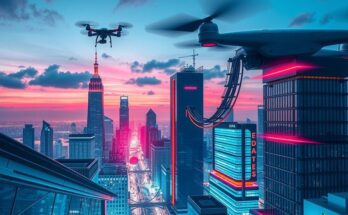In a quest for supremacy in artificial intelligence, China’s leader, Xi Jinping, envisions AI as a catalyst for monumental changes in the nation’s economy and society. However, the unpredictable ramifications of this technology might challenge the Chinese Communist Party’s (CCP) stringent control and traditional ideologies. While the leadership is considering relaxing some regulations, the inherent tendencies toward overregulation and cautious incrementalism could hinder these ambitions.
Xi has positioned AI as a strategic focus, urging rapid development to propel China beyond its decade-long approach to innovation. He emphasized breaking from the traditional growth patterns that have dominated the last 40 years. At the recent Party meetings, Xi called for ‘new quality productive forces’ to instigate significant technological breakthroughs that can reshape global economies and societies profoundly.
The military arena is also a central battlefield for AI’s transformative power. Xi seeks advancements that simultaneously elevate various military capabilities, aiming for ‘leapfrog’ technologies that would grant the People’s Liberation Army (PLA) a considerable advantage. Analysts envision AI redefining warfare, potentially revolutionizing military operations akin to past technological revolutions, changing how conflicts are waged fundamentally.
The CCP has pursued a ‘whole-of-society’ agenda in technological advancement, though discrepancies persist among societal factions. Various segments of society prioritize different approaches to AI. Ultimately, Xi yearns for AI to revitalize the Chinese economy, enhance military strength, and thrust the nation to the forefront of the global stage.
The central government’s directives have sent mixed signals regarding AI ambitions. The 2017 State Council pushed for major AI breakthroughs by 2025 and global leadership by 2030, yet specifics remain vague. Recent statements from Premier Li Qiang stress a supportive regulatory environment for AI development in response to perceived lethargy in technological innovation.
Time is of the essence, as Xi measures China’s development through its scientific and technological progress. He acknowledged that while advancements had been made, essential technologies remain controlled by outsiders, and China’s innovation capability still lags. Thus, the twin nature of AI’s opportunities and risks poses a dilemma for the party-state, which must address safety without stifling progress.
The Chinese government’s regulatory framework tends to focus heavily on national security, often at the expense of unrestricted data flow, vital for AI. Legal constraints on data transfers create significant hurdles for foreign firms, while new measures signal tighter oversight of generative AI. These elements create tensions between AI growth ambitions and state censorship, posing challenges for prospective international collaborations.
Chinese companies that navigate these regulations successfully, like ByteDance, illustrate that alignment with ideological directives is crucial. The government’s persistent emphasis on security creates internal friction, making the path toward Xi’s AI aspirations complex. For this vision to manifest, a delicate balancing act is essential, merging economic progress with social stability amidst inevitable transformations in technology.
China’s leaders, especially Xi Jinping, are racing to place artificial intelligence at the center of the nation’s economic and military modernization efforts. While aiming for rapid innovation, the CCP faces challenges from its own regulatory frameworks that prioritize social control over technological advancement. AI has the potential to transform China’s global standing, but navigating bureaucratic and ideological obstacles remains a significant hurdle.
China’s pursuit of AI supremacy highlights the dual challenges of fostering innovation while maintaining strict party control. Xi Jinping’s vision is ambitious, aiming to transform the economy and military through AI. However, entrenched regulatory and ideological constraints may hinder progress. The path to realizing AI’s potential demands a careful balancing act of growth and stability amidst the complexities of advancing technology.
This article explores China’s strategic ambitions in artificial intelligence under the leadership of Xi Jinping. It discusses the challenges posed by overregulation, the military implications of AI, and the balancing act that the Chinese Communist Party must undertake to harness technological advancements while maintaining political control and social stability. As China aims for global leadership in AI, the article reflects on the implications for society and governance.
Original Source: www.aspistrategist.org.au



